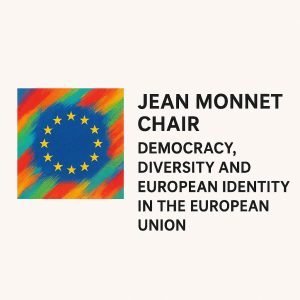
- This event has passed.
Special Lecture – “Current Issues in French Politics, Society and Culture” 16 February 2022

Special Lecture
On
Current Issues in French Politics, Society and Culture
16 February 2022

Event Report
Jean Monnet Module on Understanding Europe Integration Through Regional Lens, along with the Centre for European Studies, SIS, JNU organised an online Special Lecture on “Current Issues in French Politics, Society and Culture” on 16 February 2022.
Dr Matthias Waechter, Director General of CIFE, Centre international de formation Européenne, Nice, France was the speaker of the event. As part of his presentation, Dr. Waechter spoke extensively on globalisation in France, the issue of immigration, and the role of France in Europe. The presentation explored key themes that have shaped contemporary French politics, society, and culture.
Dr. Waechter began by offering a deeper insight into the French society by revealing that not all parts of France were integrated into the globalised economy. In fact, areas such as the old industrial regions and backwards agricultural regions were still left behind to be open to the impact of globalisation. He also stated that in recent opinion polls conducted in France, 60 % consider globalisation not as an opportunity but as a threat. Additionally, 67 % thought it would have negative consequences for France, and 56 % considered it as a menace to French identity. Dr. Waechtar explained that globalisation as a phenomenon in France was a force that challenged the traditional French model. While often celebrated as a driver of economic growth and cultural exchange, globalisation has also been perceived as a threat to national sovereignty and cultural identity. It was viewed as the result of the rise of neoliberalism, and the homogenising influence of Anglo-Saxon culture, which was also seen as particularly problematic.
In the second theme on the French exception, Dr. Waechtar highlighted the unique characteristics of French society. The emphasis on social justice, state intervention, and collective action has been a defining feature of the French model. However, the pressures of globalisation have forced France to confront the question of whether it can maintain its distinctive identity while adapting to the demands of the global economy. He remarked how President Macron’s reform agenda, aimed at modernising the French economy and improving its competitiveness, has sparked significant debate. Critics argue that these reforms threaten the very essence of the French social model, particularly the role of the state as a provider of social services.
In continuation of the discussions on globalisation and France, Dr. Waechtar also discussed immigration, which has been a highly contentious issue in France for decades. While France has a long history of immigration, the nature of immigration flows has changed significantly in recent decades. The influx of immigrants from former French colonies in North Africa has led to increased tensions and social divisions. The issue of Islam and immigration has further complicated the debate, with concerns about the integration of Muslim immigrants and the impact of religious extremism. The 2004 ban on religious symbols in schools, for example, was a controversial measure aimed at promoting secularism and preventing religious divisions. More recently, the terrorist attacks of 2015 and 2016 have intensified fears about the threat posed by radical Islam and the potential for social unrest.
The final theme, France’s role in Europe and the world, explored the nation’s evolving position on the global stage. Dr. Waechtar explained that, traditionally, France has sought to maintain its independence and influence through multilateralism. However, the rise of other powers, such as Germany, and the challenges of globalisation have forced France to reassess its strategic priorities. The rejection of the EU Constitution in 2005 highlighted the deep-seated scepticism among many French citizens towards European integration. While Macron and his supporters advocate for a stronger and more integrated Europe, others argue for a return to national sovereignty and protectionism.
Dr. Waechtar’s lecture provided a comprehensive overview of the key challenges facing France in the 21st century. He concluded his lecture by emphasising how the interplay between globalisation, national identity, and social justice is a complex and multifaceted issue that will continue to shape French politics and society for years to come.
